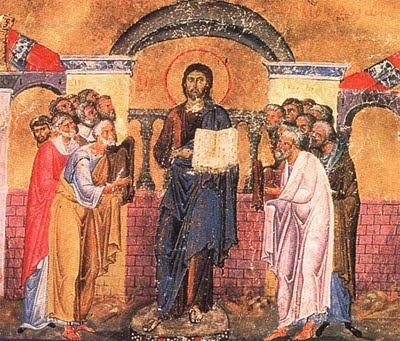2495. It has been stated and shown in many places already that the Word has an internal sense within it that is not seen in the letter. Also the nature of that sense is evident from the explanation given so far from Genesis 1 onwards. Even so, because the few at the present day who do believe in the Word do not in spite of that belief know about the existence of such an internal sense, let further confirmation of it be given.
[2] The Lord describes the close of the age, that is, the final period of the Church, as follows,
Immediately after the affliction of those days the sun will be darkened, and the moon will not give its light, and the stars will fall from heaven, and the powers of the heavens will be shaken. Matthew 24:29; Mark 13:24-25.
That 'the sun' here does not mean the sun, nor 'the moon' the moon, nor 'the stars' the stars, but that 'the sun' means love to the Lord and charity towards the neighbour, 'the moon' faith received from love and charity, and 'the stars' cognitions of good and truth, has been shown in 31, 32, 1053, 1521, 1529-1531, 2120, 2441. Thus these words spoken by the Lord mean that when the close of the age or final period has arrived there will no longer be any love or any charity, or consequently any faith. It is evident that this is their meaning from similar words of the Lord that occur in the Prophets, as in Isaiah,
Behold, the day of Jehovah comes, to make the earth a desolation, and He will destroy its sinners from it. For the stars of the heavens and their constellations will not shine with their light. The sun will be darkened in its rising, and the moon will not give its light. Isaiah 13:9-10.
This too refers to the final period of the Church, or what amounts to the same, the close of the age.
[3] In Joel,
A day of darkness and thick darkness, a day of cloud and obscurity. The earth quaked before Him, the heavens trembled. The sun and the moon were darkened, and the stars withdrew their shining. Joel 2:2, 10.
Here the meaning is similar. Elsewhere in the same prophet,
The sun will be turned into darkness, and the moon into blood, before the great and terrible day of Jehovah comes. Joel 2:31.
In addition in the same prophet,
The day of Jehovah is near. The sun and the moon have been darkened, and the stars have withdrawn their shining. Joel 3:14-15.
In Ezekiel,
When I have blotted you out, I will cover the heavens and darken their stars, I will cover the sun with a cloud, and the moon will not give its light. All the bright lights in the heavens I will make dark over you, and I will put darkness over your land. Ezekiel 32:7-8.
Likewise in John,
When he opened the sixth seal I looked, and behold, a great earthquake took place, and the sun became black as sackcloth made of hair, and the full moon became like blood, and the stars fell to the earth. Revelation 6:12-13.
In the same book,
The fourth angel sounded, so that the third part of the sun was struck, and the third part of the moon, and the third part of the stars, and a third part of them was darkened. Revelation 8:12.
[4] These places show clearly that the Lord's words in the Gospels embody much the same as the Lord's words in the Prophets - namely that in the last times there will be no charity and no faith - and that this is the internal sense. All this is further evident in Isaiah,
The moon will blush, and the sun be ashamed, for Jehovah Zebaoth will reign on Mount Zion and in Jerusalem. Isaiah 24:23.
The meaning here is that faith, which is 'the moon', will blush, and charity, which is 'the sun', will be ashamed because their condition is such; for it cannot be said of the moon and the sun that they will blush and be ashamed. And in Daniel,
The horn of the he-goat grew towards the south, and towards the east, and grew even towards the host of heaven, and it cast down to the earth some of the host, and of the stars, and trampled on them. Daniel 8:9-10.
Here it is evident to anyone that 'the host of heaven' does not mean a host, nor 'the stars' the stars.







